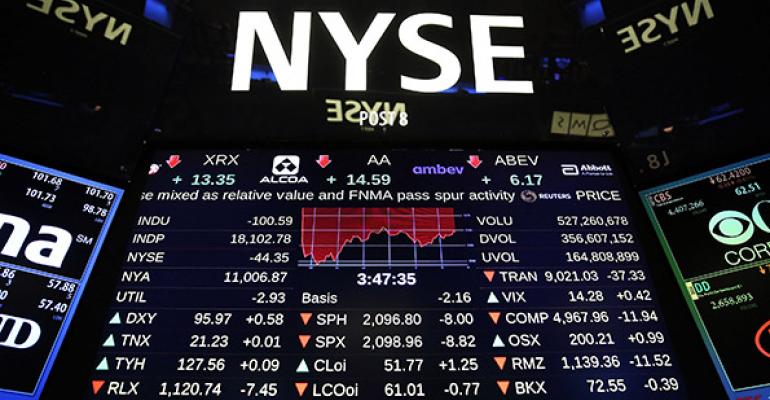By Rachel Evans
(Bloomberg) --In a world where there are more stock indexes than stocks, refusing to cooperate has its consequences.
At least that’s one way of explaining the tremors that were sent through the market this week when S&P Global Inc. barred companies with multiple share classes from joining its main U.S. indexes, including the S&P 500. The move blacklists an equity structure made popular by Facebook Inc. and Alphabet Inc. and comes just days after FTSE Russell, a unit of London Stock Exchange Group Plc, took its own stance on voting rights.
That the nuts and bolts of benchmark construction play a role in how companies govern themselves should be no surprise to anyone paying attention to the stock market over the last decade. Share indexes are the building blocks of exchange-traded funds, and a company excluded from them loses access to the world’s fastest growing investor.
That indexers emerge as a hero of shareholder rights? That’s more of a shock.
“It’s amazing an index would have that kind of power,” said Eric Balchunas, an ETF analyst with Bloomberg Intelligence. “But with so much money going passive, the pressure’s on.”

You’re Barred
Of course, shareholders already have a mechanism for voicing their opinion on corporate governance -- don’t buy the stock. Since ETFs disclose their holdings, it isn’t hard for investors to determine whether companies that trouble them are in the portfolios.
But S&P Global’s decision takes the issue to another level. Under the rule, corporations that issue shares conveying different rights for investors won’t be eligible to join the S&P 500 Index. Nearly $9 trillion is benchmarked to the S&P 500 alone, according to its overseers, and hundreds of billions more follow its mid-cap and small-cap measures.
FTSE Russell last week banned companies that don’t give shareholders at least 5 percent of voting rights from joining its gauges. Existing constituents meanwhile have until 2022 to get their houses in order.
“It’s our job to set minimum standards, in the past these minimum standards have been set by the regulators but regulators are competing for listings,” Mark Makepeace, chief executive officer at FTSE Russell, said on Bloomberg Television last week. “About 30 percent of the market wants to passively manage, so for those users they don’t want this risk in their benchmark.” Makepeace could not immediately be reached for further comment.
Luke Shane, a spokesman for S&P Dow Jones Indices, S&P’s indexing unit that was formed via a joint venture with CME Group Inc., declined to comment beyond the company’s official release. Companies with multiple share class structures “tend to have corporate governance structures that treat different shareholder classes unequally,” according to S&P’s July 31 press statement.
A media representative at index provider MSCI Inc. wasn’t immediately able to comment. Henry Fernandez, the company’s chief executive, has previously said that clients have voiced concerns about the use of dual classes.
Fewer Owners
The message is clear: benchmarkers are listening to the growing chorus of concern over whether the rise of passive investing has weakened corporate governance.
Index-tracking funds now manage $5.7 trillion, with exchange-traded funds housing $3 trillion, up from $400 billion a decade ago, data compiled by Morningstar show. Active funds manage $10.6 trillion, the data show, but those assets have stagnated and begun to decline.
This growth has prompted handwringing about whether passive investing creates a less efficient stock market, with the Securities and Exchange Commission’s Kara Stein noting in a speech in February that stock ownership is becoming concentrated with just a few large institutional investors.
The argument goes that passive funds are less vocal as shareholders, giving companies free rein to do what they want without fear of repercussions on their stock price, leading to a kind of “ Marxism.” Indexing behemoths such as BlackRock Inc. and Vanguard Group have struggled to change the narrative. Until now.
Active Boost
S&P’s decision is “a huge win for investors,” according to Amy Borrus, deputy director of the Washington, D.C.-based Council of Institutional Investors, which lobbies for better corporate governance on behalf of more than 120 pension funds and endowments.
“FTSE Russell’s decision was an important breakthrough,” she said. “It was also a rebuke to companies that would deny public shareholders any voice in company matters and ensures that some minimal corporate governance standards are required to get into indexes.”
The group hopes indexers will deter at least some founders of future startups from going public with multiple classes of shares carrying unequal voting rights, Borrus said. Still, the S&P’s ruling only applies to new entrants to its main indexes, with the likes of Facebook and Alphabet grandfathered in. Companies with multiple share classes remain eligible for the S&P BMI Global Indices and the S&P Total Market Index.
The shift could however provide a much-needed boost to active managers, who’ve struggled to demonstrate their value versus passive funds that have often performed as well or better. If some indexers can’t buy a particular stock, active managers could step in.
“This could be the rare case where both active and passive cheer,” said Balchunas.
--With assistance from Benjamin Robertson and Andrea Tan.To contact the reporter on this story: Rachel Evans in New York at [email protected] To contact the editors responsible for this story: Nikolaj Gammeltoft at [email protected] Eric J. Weiner





